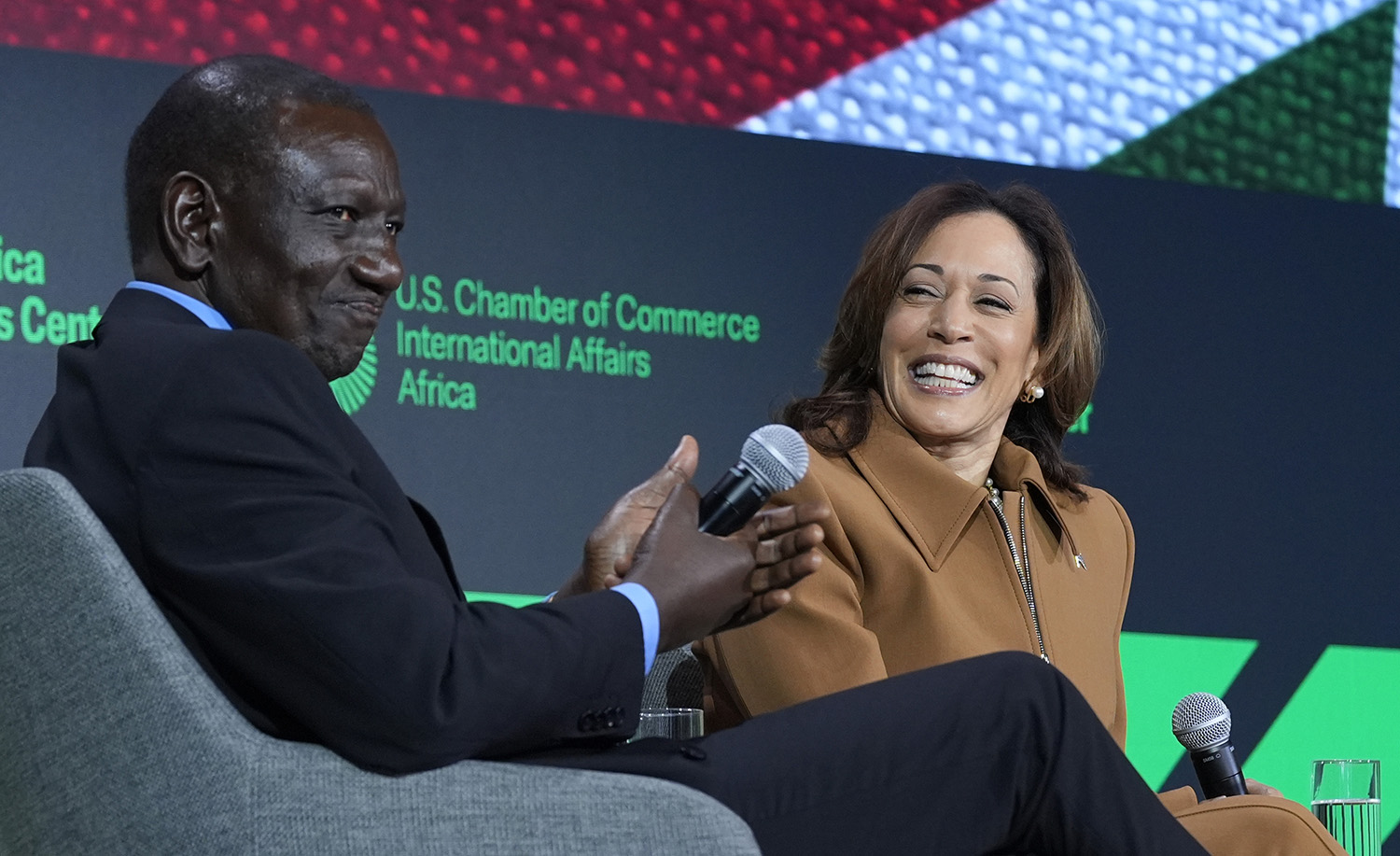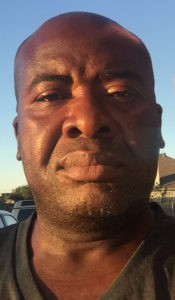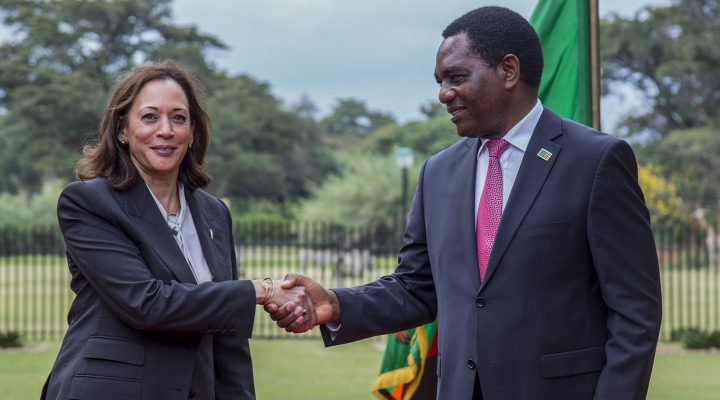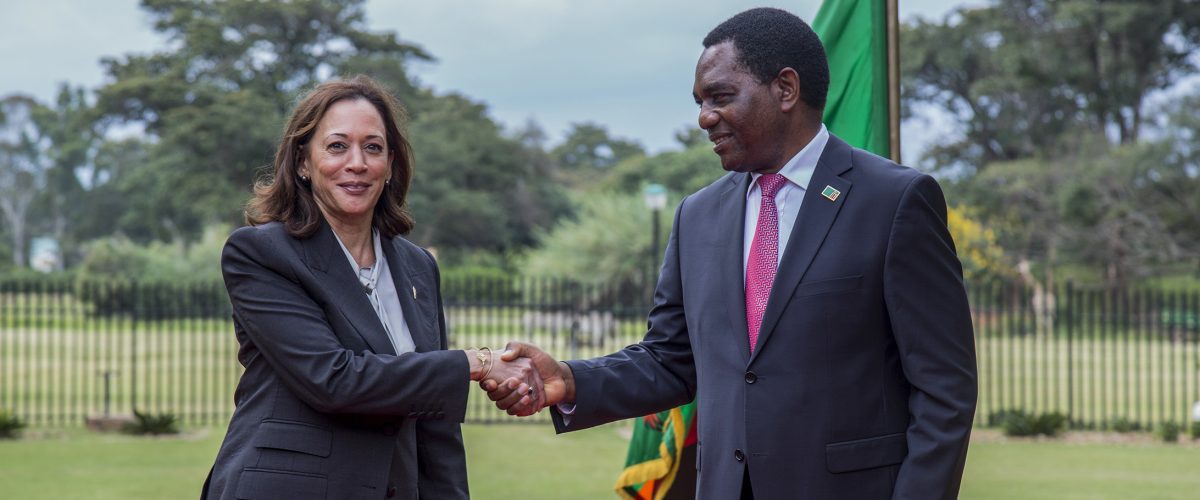A few days after Joe Biden withdrew from the 2024 presidential race and backed his vice president, Kamala Harris, to run for the office, a message began making the rounds via WhatsApp among some Africans in church groups and elsewhere about the need to unite and support Harris’ candidacy.
The message was titled “Africans in the Diaspora for Kamala Harris.”
Harris is the daughter of a Jamaican father and Indian mother, whose maternal grandfather, Painganadu Gopalan, at a time in his career in the 1960s, lived and worked in Zambia, Southern Africa, and Harris visited the country as a child to see him.
When Harris visited Zambia last year as part of a three-nation African tour, Zambian President Hakainde Hichilema described her as “somewhat a daughter of our own country, someone who spent time here in her early years.”
Harris also is viewed as an in-law in Africa’s most populous country, Nigeria, as her niece, Meena Harris, is married to a Nigerian of Igbo origin, Nikolas Ajagu. In Igboland, a good in-law is celebrated as a god of sorts whose large heartedness benefits the family.
“Many Africans consider Harris one of their own.”
Looked at from these perspectives, many Africans consider Harris one of their own, and it is no surprise some already are salivating about the prospect of a Harris presidency. The WhatsApp message made it clear what Africa stood to benefit.
“There are over 2 million of us in this country. Let’s make a good showing,” the notice reads.
One of those who responded to the call is Joseph Ajibola, a Nigerian-born American citizen and Houston-based realtor. He told BNG that many other Africans heeded the call for the Zoom meeting to support Harris. But the meeting, scheduled for July 31, was marred by what he suspected to be a technical problem.
“There was enthusiasm for her candidature among Africans. I know of a Ghanaian in New York who was on the Zoom meeting,” he said, adding that he thinks Harris, if elected president, will do a good job in the education sector and other areas. “We Africans love education, but the cost of acquiring one in America is too much. She knows what middle class is all about. She wants to make health insurance and housing affordable, helping first-time homeowners, giving them $25,000. That will make a lot of people move into their home instead of renting apartments. Those are things that will make ordinary people benefit. She’s talking about making minimum wage $20 an hour.”

Kenya’s President William Ruto, left, and Vice President Kamala Harris participate in a discussion at the U.S.-Kenya Business Forum at the Chamber of Commerce in Washington, Friday, May 24, 2024. (AP Photo/Susan Walsh)
Like Ajibola, Lukowe Katantazi, a Ugandan-born American citizen who lives in Boston, thinks Harris inspires hope, more than her Republican rival, Donald Trump. For this reason, Katantazi said that, just like he voted for Hillary Clinton in 2016, he will vote for Harris this November.
“I’m for Harris. I think she will lead America to (greater height). She’s a good choice based on her age and the generation and values she represents if you compare that to the age of Biden and Trump,” Katantazi said.
Unlike many Africans however, Katantazi said his support for Harris is less about her skin color but more about her promise and the Democratic Party, to him, is more people friendly.
“I think being Black doesn’t matter much to me because I don’t normally expect much from politicians,” he explained. “But the values of the Democratic Party (are ones I subscribe to.)”
“Even the racism in the Democratic Party is not the same as that of Republicans in terms of Black representation.”
Democrats, he said, care more about the middle class while Republicans are concerned about the rich. He is a father who received vouchers for child care during Trump’s tenure but believes he got an upgrade after Biden came into office.
Elaborating on the difference between Republicans and Democrats, Katantazi said: “Even the racism in the Democratic Party is not the same as that of Republicans in terms of Black representation. When you look at the positions occupied, you will see that Blacks (get a look in, in the Democratic party) compared to Republicans. When Barack Obama was to be president, he chose Biden. When Biden was campaigning to be president, he chose Kamala. So, as an African, even if you don’t benefit directly, you feel you are represented. It makes you feel a sense of belonging, though I don’t think even if Kamala wins that Africa stands to benefit especially. When Obama was president, we didn’t see his impact in Africa.”
Nonetheless, Harris is a better option than having a dictator in power, he argued. “When I look at Trump, I see him as a dictator, like (Yoweri) Museveni (president of Uganda who has been in power since 1986). The nepotism Trump showed is the nepotism African leaders display. He (involved) his daughter and son-in-law (in government) when he was president.”
Not all Africans, however, are opposed to Trump. An African of Tanzanian origin who resides in Dallas told BNG while Harris may be a good presidential material, she would, if presented with an opportunity, choose to vote for Trump. And just like Trump has questioned Harris’ identity, the Tanzanian, who asked to speak on the condition of anonymity, said Harris is not Black.
“She’s not black. That’s No. 1. She may be OK but if I’m gonna vote, I will vote for Trump. But I have nothing against her. She may be good to somebody else, she may even do better, but everyone has their own views,” she said.
“Not all Africans, however, are opposed to Trump.”
Like the Tanzanian, another African of Kenyan heritage is not taken in by the Kamala effect. He based his grouse on the Democratic Party’s “open-border policy” and “welfare” packages for migrants and the embrace of LGBTQ activities, which he says does not sit well with him as a Christian.
Most African countries are known to be conservative and intolerant of LGBTQ people and attempts by Western countries to canvass for human rights and justice for them have been met with suspicion and resistance. Harris, some observers worry, will continue the trend of affirming LGBTQ inclusion.
During her three-nation African tour last year, Harris, explicitly addressed LGBTQ inclusion: “I feel very strongly about the importance of supporting the freedom and supporting and fighting for equality among all people, and that all people should be treated equally. I would also say this is an issue we consider and I consider to be a human rights issue, and that will not change.”
At the same time, she has offered a strong voice against the historical legacy of slavery.
In Ghana, she visited Cape Coast Castle, the site from which Africans, centuries ago, were shipped as slaves to Europe and America. Recalling that shameful act of humanity on both sides of the divide, she said: “We are all in because there are longstanding ties between our people. We have an intertwined history, some of which is painful and some of which is prideful and all of which we must acknowledge, teach and never forget.”
It remains to be seen the extent to which African-born immigrant votes — or the lack of them — for Harris could help her presidential bid in November when added with the votes of American-born Blacks, a majority of whom have traditionally favored the Democratic Party.
According to a Pew Research survey published in January, “the number of Black eligible voters in the United States is projected to reach 34.4 million in November 2024 after several years of modest growth.”
Another survey by the same agency released Aug. 22, shows Black voters, which includes those who say their race is Black and non-Hispanic, “overwhelmingly support Vice President Kamala Harris over former President Donald Trump.”
“About three-quarters of Black voters (77%) say they would vote for or lean toward Harris if the 2024 presidential election were held today,” the report states. “Another 13% say they would back or lean toward Trump.”
 Anthony Akaeze is a Nigerian-born journalist who currently lives in Houston. He covers Africa for BNG.
Anthony Akaeze is a Nigerian-born journalist who currently lives in Houston. He covers Africa for BNG.
Related articles:
As Biden throws his support behind Kamala Harris, will the Black voting pattern change?
These Black religious leaders say Democrats are ‘perpetuating racism’
Black voters should be especially wary of Project 2025, speakers urge


